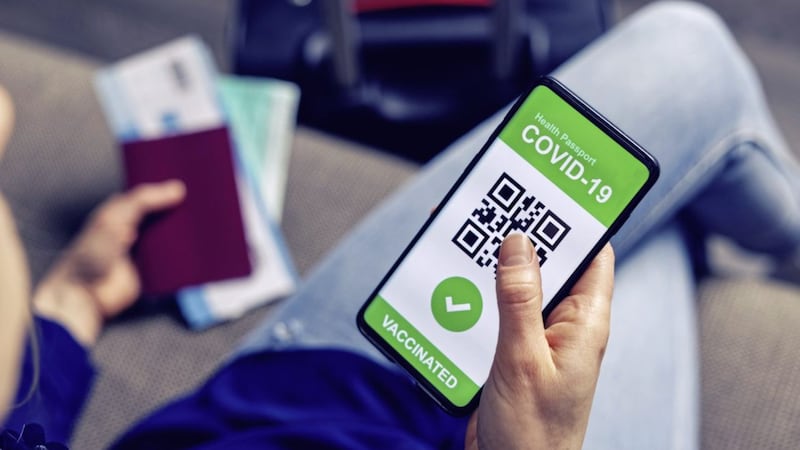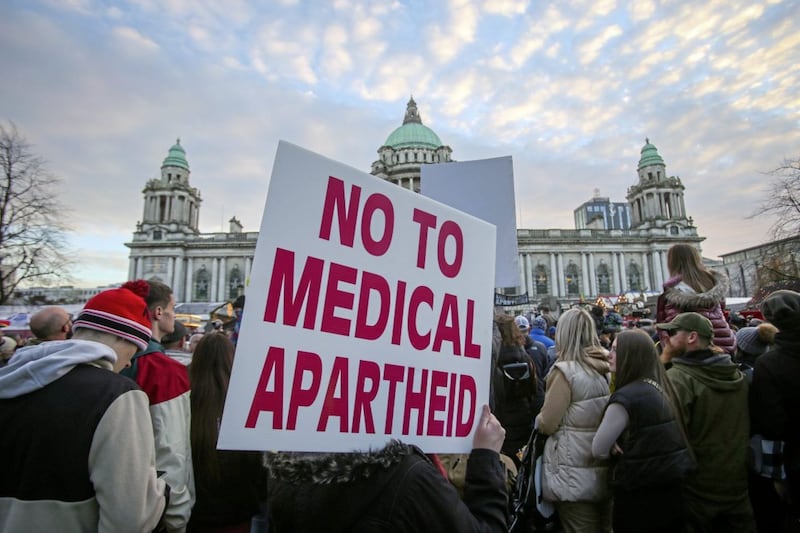Health Minister Robin Swann has said he wants a domestic vaccine certification scheme in place in Northern Ireland "as soon as necessary".
Mr Swann said it was "regrettable" that the Executive has yet to agree a policy position on so-called vaccine passports.
Yesterday, Stormont ministers agreed a plan to drop the one metre social distancing requirement across a range of venues, but decided that plans to require vaccination passports for entry to the indoor seated venues would be advisory only.
At the meeting, SDLP Minister Nichola Mallon proposed Covid vaccine passports for those venues be introduced by regulation but was blocked in the Executive vote.
While the proposal was backed by Alliance minister Naomi Long, it was voted down by the other Executive ministers, including Mr Swann.
Those ministers instead voted to issue guidance to the venues, which include theatres and indoor concert venues, recommending the use of proof of vaccine as one entry requirement.
SDLP leader Colum Eastwood branded the decision as "astounding and reckless".
In response, Sinn Féin minister Conor Murphy accused other parties of playing politics.
The health minister said he did not back the proposal to make passports mandatory for indoor seated venues because such a scheme was "neither agreed nor ready".
He said the Executive would have been "ridiculed" if it had told businesses fearful about the end of the furlough scheme that ministers had decided to mandate a vaccine passport system that was not ready to use.
The issue is set to come to a head again next week when ministers consider whether to remove the one-metre social distancing requirement for hospitality venues.
The DUP has consistently voiced concern about any move to introduce vaccine passports, citing potential human rights and equality issues.
Mr Swann said: "I want a domestic vaccine certification scheme to be in place, on the books, available for use as soon as necessary.
"It is regrettable that the Executive has yet to agree a policy position on this. I wrote to Executive ministers as far back as April 22 asking for this matter to be taken forward by TEO (the Executive Office) through the creation of a cross-departmental working group.
"We have waited for the Covid Task Force to pick up the ball and run with this. It is central to the task force's entire purpose - charting a pathway out of restrictions.
"It is important to note that the parties that have been most vocal in recent days advocating for the introduction of domestic use certification had until then also shown no actual interest in helping me to pursue a policy decision.
"How that tallies with their public pronouncements of recent days is a matter for them to explain."
Mr Swann added: "If we can get a domestic scheme agreed - with the necessary regulations and technology in place - it gives us both options and opportunities, new tools to use if required.
"It also means our citizens won't be disadvantaged when they travel to jurisdictions where certification is mandatory - be that going for a drink in Donegal or a football match in Scotland.
"There will still be decisions to make on if or when or where vaccine certification would be mandatory in Northern Ireland. We could decide to bring it in straight away for certain sectors. Or we could keep it as an option to deploy if the Covid situation worsens again, or if there is non-compliance in key areas.
"But we need to get it prepared first. Again it's regrettable that a decision hasn't been taken to date. In the meantime I would ask people not to be distracted by the pragmatic decision taken last night regarding indoor seated entertainment venues.
"With furlough ending, I believe it was not practical or fair to ask that sector to wait weeks while the technology and regulations for a domestic scheme were put in place.
"Particularly when that sector has said it is willing and able to do the checks on the door now, as it has already been doing for outdoor events. To be clear - there is a very different technological requirement when proof of vaccination is required in law and when proof of vaccination is required in guidance."
The minister continued: "That was the choice yesterday evening - our venues, and the many workers that work within them, could become more viable and take real steps to reduce risk, or I could have sided with a proposal to introduce a scheme that was neither ready nor agreed, but one which I had been waiting for five months for a decision on.
"The Executive would have been rightly and widely ridiculed had we taken the decision to introduce a policy that was nowhere near ready for implementation."
SDLP leader Colum Eastwood said opposition to the introduction of vaccination passports was "astounding and reckless".
He said: "This is a moment for political leadership. The warnings from senior health service professionals could not be starker.
"Unless rates of transmission fall, we are looking at a bleak winter scenario that will push health workers beyond their limits and see some emergency services collapse."
Health minister shouldn't have to defend decisions, Sinn Féin says
Sinn Féin Finance Minister Conor Murphy has accused other parties of playing politics as he expressed regret the Executive was unable to reach consensus on the issue of vaccine passport.
At last night's meeting, the SDLP voted against a move to issue guidance to indoor seated venues on the use of vaccine certification, rather than making it a mandatory requirement in regulations. The Alliance Party abstained while all other ministers backed the move to use guidance rather than regulation.
Mr Murphy insisted his party had no ideological issue with using vaccine certification as a requirement of entry into certain venues.
He said, though, more work was still needed to get a system ready to be rolled out in Northern Ireland if it was needed.
He told a Stormont press conference that ministers at the Executive should strive for consensus.
"One of the key issues is unanimity in the coherence of the public message and making sure the public understand what we're continuing to ask them to do, and I'm sorry and regret that that was not possible coming out of the Executive last night," he said.
"We shouldn't have an issue where the health minister (Robin Swann) feels he has to come out and defend decisions because other parties have come and attacked the advice that was given by his department last night - that's not where we need to be.
"I do recognise there's an election on the horizon and I do recognise that parties want to carve out their own space, but the pandemic is too important an issue to play politics."
Health minister writes to Executive ministers to express frustration
It has emerged that the health minister wrote to Stormont ministers on Saturday expressing frustration at a lack of progress developing a vaccine passport system.
In the letter, which has been seen by the PA news agency, Mr Swann asked why the Executive Office Covid-19 taskforce had still not produced a policy paper on the issue, five months after he asked for the work to be done.
"I wish to place on record my frustration at the continuing lack of an Executive policy decision on a domestic Covid vaccine certification scheme," he wrote.
"In other jurisdictions, a policy position on domestic use certification has been established as an intrinsic part of their routemaps for exiting Covid restrictions."
Mr Swann said it appeared that some within the Executive Office believed the passport should be developed solely by his department.
"It is difficult to view this as anything other than a tactic to frustrate consideration and debate of the issue, as opposed to a considered position," he wrote.
"I am concerned that whatever the basis for it, such a position runs contrary to the entire basis of the TEO-led Covid taskforce and its lead role in bringing forward proposals to chart a sustainable route out of restrictions."
In the letter to Executive ministers, Robin Swann said the continued absence of a domestic use certification scheme in Northern Ireland was disadvantaging people when they travel to neighbouring jurisdictions where such schemes are mandatory.
He said it was also significantly limited the Executive's options in terms of current and future decisions on restrictions.
The minister said the system could be rolled out on a voluntary basis at first with the option of switching it to mandatory if the Covid-19 situation worsened or there was poor compliance with the guidance.
"These are the sort of policy choices I have been expecting to see being addressed in a TEO/taskforce paper," he said.
Mr Swann added: "I would ask as a matter of urgency that the TEO paper on domestic use certification be brought to the Executive without further delay.
"This would allow us to proceed with coherent policy choices to the benefit of the people we serve, not least important sectors of our economy seeking urgent decisions."
In his letter to the Executive, Mr Swann said the advice of the chief medical officer and chief scientific adviser was that limiting access to hospitality and entertainment venues to those who are fully vaccinated and with a negative lateral flow test would "mitigate risk".
The minister acknowledged his department would have an important contribution to make on the system and he said officials had been examining how it might work.
"However, without clear direction from the Executive of the nature and scope of any such scheme, this work can only proceed so far," he added.
"It will take time to complete, but the quicker a decision is made, the sooner a scheme can be fully operational.
"I would highlight that a continuing delay to bring forward policy proposals in this space effectively amounts to a decision not to adopt such an approach.
"Those ministers who advocate such a position, on the basis of ideological objections to any form of vaccine certification, need to be clear that they will ultimately be accountable for the outworking of such an approach.
"For my part, I urge - and want the opportunity to participate in - a fully informed and evidence-based policy debate."








